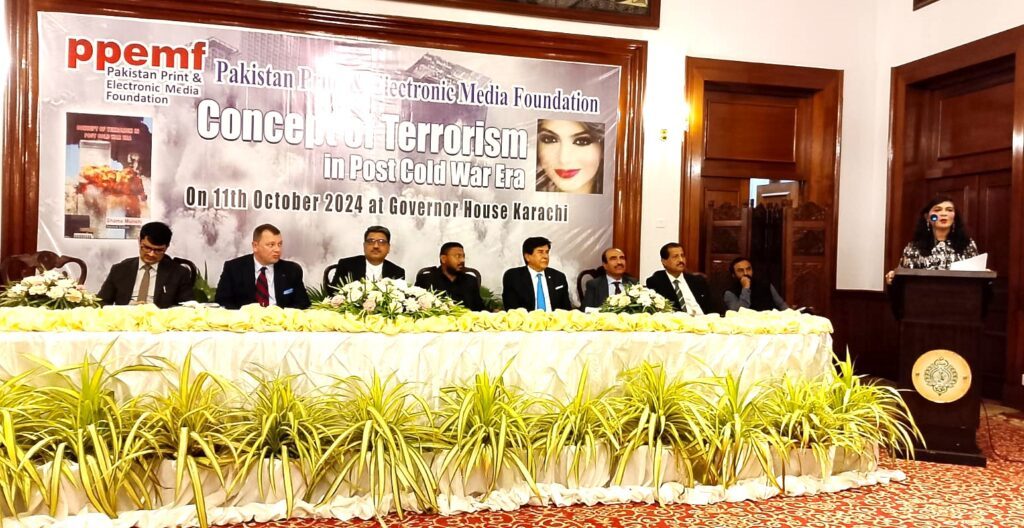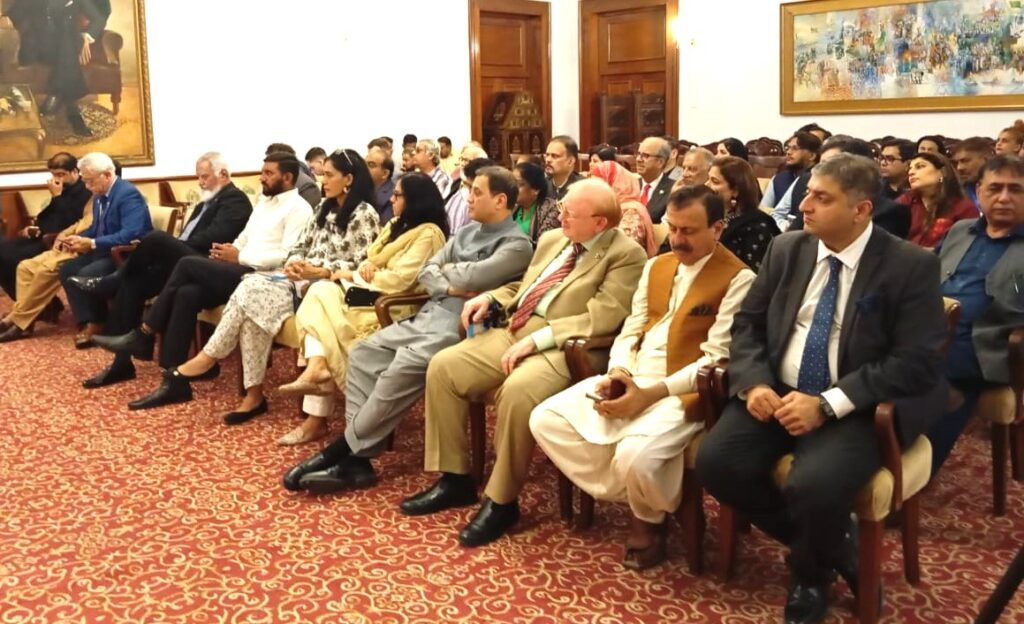
KARACHI: The much-anticipated launch of Shama Munshi’s 2nd edition of her latest book, “Concept of Terrorism in the Post-Cold War Era,” has taken place on Friday at the prestigious Governor House Karachi. This thought-provoking work delves into the root causes, global facilitators, and geopolitical dimensions of modern terrorism, with a particular focus on the role of the United States following the collapse of the Soviet Union and its attempt to create its hegemony across the globe.
Hassan Nourain, the Iranian Consul General in Karachi, attended the event as the Chief Guest, alongside Andrey Fedorov, the Russian Consul General in Karachi, as the Guest of Honor. Speakers, including Aftab Munshi, former ambassador GN Baloch, and former ambassador Jamel Ahmed Khan, further enriched the discussion with their expertise in international relations and security. In their speeches, former ambassadors and dignitaries commended Shama Munshi for her timely and bold stance in addressing terrorism, especially through an Islamic perspective.
They praised her efforts to confront this menace by identifying its root causes and providing a critical analysis of the geopolitical forces behind it. In a recent forum focused on global security and terrorism, both Iranian Consul General Hassan Nourain and Russian Consul General Andrey Fedorov delivered powerful speeches addressing the ongoing challenges posed by terrorism and the need for unified global efforts to confront these threats. Consul General Hassan Nourain offered an in-depth analysis of the factors driving terrorism, pointing out that the phenomenon is often rooted in political grievances, social injustices, and foreign interventions that destabilize regions.
Nourain stressed the role of state-sponsored terrorism, particularly highlighting the actions of Zionist Israel against Palestinians, which he argued contribute to broader regional instability and global insecurity. He emphasized that such acts of violence are not isolated, but part of a larger pattern of oppression that fuels resentment and extremism. Nourain called for global solidarity in addressing terrorism, asserting that the fight against terror cannot be limited to military means alone. Instead, it requires addressing the socio-political conditions that allow terrorism to thrive.

Russian Consul General Andrey Fedorov supported this viewpoint by calling for a peaceful, diplomatic approach to resolving conflicts. He argued that terrorism now has a clear, identifiable presence (“a definite face”) in today’s world, and the international community must unite to eliminate it. Fedorov warned that a purely reactive, military response to terrorism is insufficient and that peace is the only sustainable path forward. He highlighted that addressing the root causes of terrorism—such as poverty, disenfranchisement, and foreign interventions—is essential for any long-term solution.
Fedorov’s speech also stressed the responsibility of the international community to move beyond temporary measures and confront the systemic issues that breed terrorism. He advocated for a collaborative global approach to terrorism, where countries work together not only in terms of intelligence-sharing and security cooperation, but also in promoting economic development, educational opportunities, and conflict resolution initiatives in regions prone to terrorism.
Both diplomats presented a vision where the fight against terrorism goes hand-in-hand with broader efforts to promote justice, peace, and development. Their speeches underscored that terrorism cannot be defeated through force alone—it requires a concerted effort to address the underlying conditions that fuel extremism and violence. Their calls for peace and unity were not merely theoretical; they emphasized that global security and stability depend on addressing these fundamental challenges in a way that promotes long-lasting peace rather than temporary victories.
Shama Munshi’s book offers an insightful and critical examination of post-Cold War terrorism, dissecting the complex global and ideological shifts that have allowed extremism to flourish. Her research offers fresh perspectives on countering terrorism and ensuring long-term global peace. Shama Munshi is a distinguished author and researcher with a focus on international relations, terrorism, and security studies. Her book, “Concept of Terrorism in the Post-Cold War Era,” offers a rigorous analysis of the evolving nature of global terrorism, examining its causes, facilitators, and the international responses to the growing threat of extremism.



